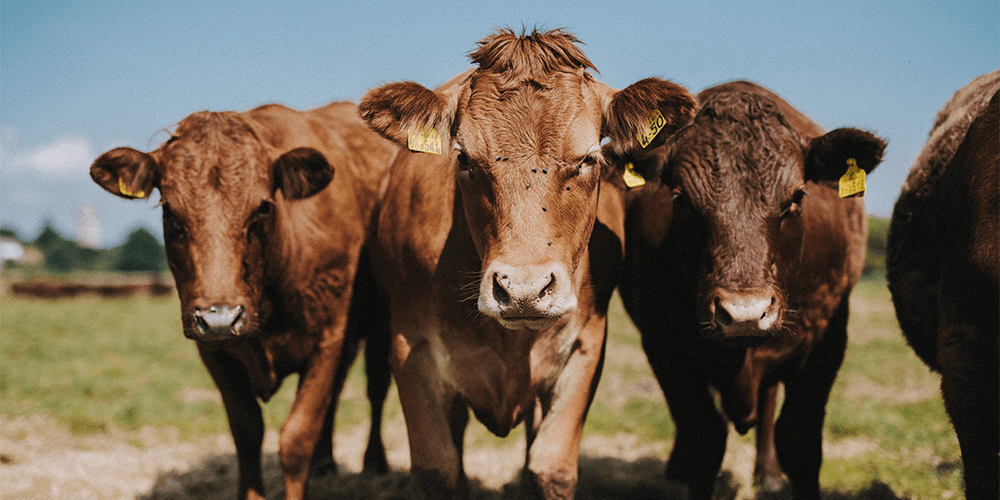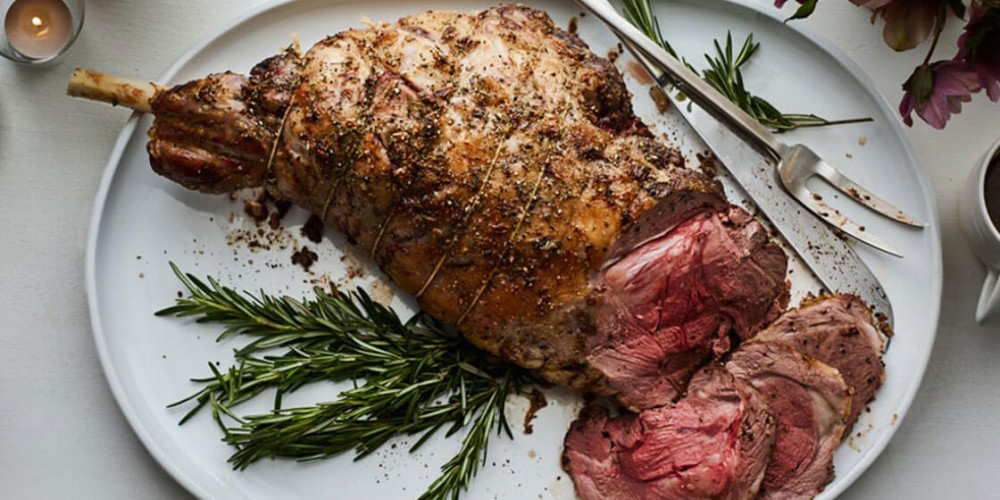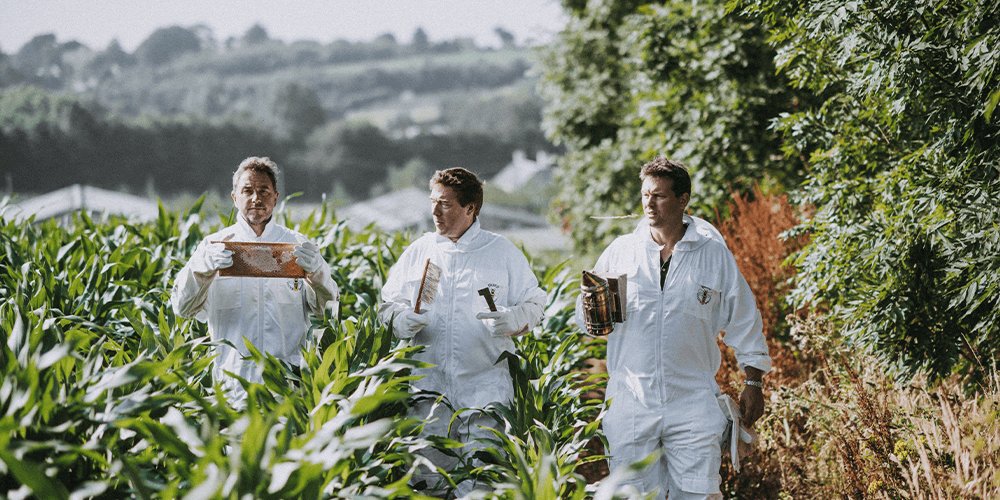For us, nothing says Spring like a delicious lamb roast accompanied by minted, seasonal veg and garlic butter new potatoes!
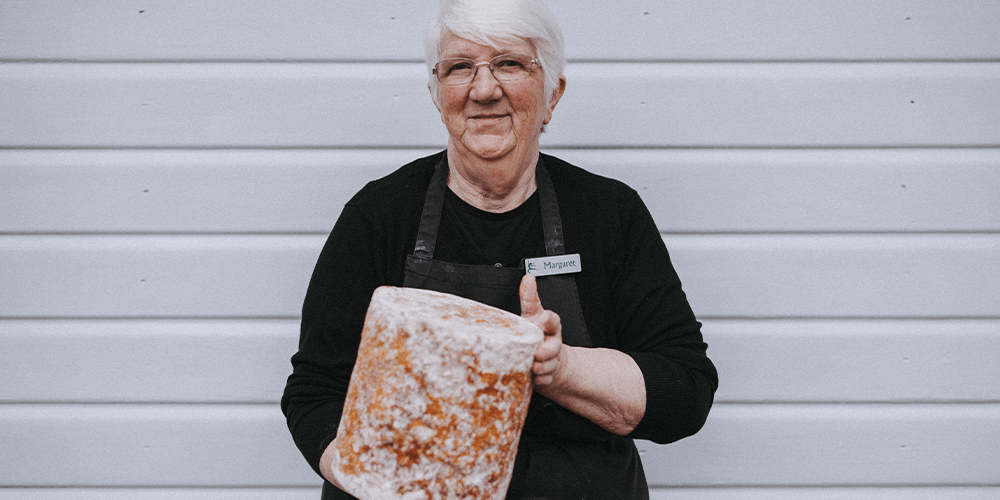
YOUR PRODUCER NEEDS YOU!
Posted in Food Hall, News, Food & Drink, Seasonality, Supporting Local on 18 Apr 2020
Written by George Dart: Catastrophe or catalyst? The future of artisan food is in jeopardy, here's how each of us can determine its future...
FOOD LOVERS CALL TO ARMS
Here at Darts Farm, the familiarity of Easter celebrations was welcomed blissfully. In such uncertain times, the nostalgia of a family Easter egg hunt and feasting on a leg of locally reared spring lamb brought a sense of great comfort. Our fields have been ploughed with new seed planted, our herd of native Ruby Red cattle have been turned out onto our wetlands and a choir of uplifting birdsong can be heard across the farm. Experience now tells us that we must not take these simple pleasures for granted, as an underlying anxiety clouds every moment. Today, the future of our artisan world lies in jeopardy, along with the traditions, crafts and livelihoods that come with it. The realisation that we are part of a food system that supports hundreds of families across the Devon and further afield empowers us with a responsibility to ensure its survival.
March was a record-breaking month for the supermarkets, who were able to capitalise on the coronavirus crisis. However, panic buying and the subsequent retailers responses came at a huge cost to many producers, whose products were ruthlessly cleared to make space for ‘commodity’ items. Years of spurious marketing campaigns advocating their ‘local values’ went out the window as shelf space was earmarked for industrial brands, many of which imported, to enhance profitability and manage volume. Whilst the streamlining of each supermarkets offering has proved painful for the countless producers whose livelihoods depended on it, the wider repercussions will be felt by all in society. This exacerbation of a centralised commodity-based food system poses a very real and serious threat to our UK food security.
Our last major food emergency in the UK was during the Second World War, when a mobilisation of female farmers dubbed ‘Land Girls’ along with a ‘Dig for Victory’ campaign secured a stable and sustainable food source. Fast forward to today and there is a fundamental difference in how we manage our food systems. Back then, we had a comprehensive latticework of local food supply infrastructure consisting of mixed family farms, local abattoirs, dairies, butchers and greengrocers – this provided a diversified, resilient and dependable means of feeding the nation. Over the past 50 years, this has been dissolved and replaced with a highly centralised commodity-based supermarket supply chain where each product is sourced from a diminishing number of globalised large-scale industrial farms, often practicing monoculture. Food is processed, packaged and transported through central distribution warehouses to satisfy ‘just-in-time’ replenishment systems. Consequently, a monopoly of supermarkets benefit from lucrative economies of scale and thus determine market prices – more often than not at the expense of the producer. The Coronavirus crisis has exposed the alarming fragility of this type of food system. When restaurants and other eateries closed their doors overnight, the burden of almost half of our food consumption fell onto retailers – doubling demand. In essence, there may be one or two carrot suppliers for every Sainsburys and Morrisons in the country. It is simply not viable to ask that producer to double the output of their raw material overnight whilst maintaining a feasible price point. When this system is extended to the majority of products, the ramifications going forward could be severe food price fluctuations.
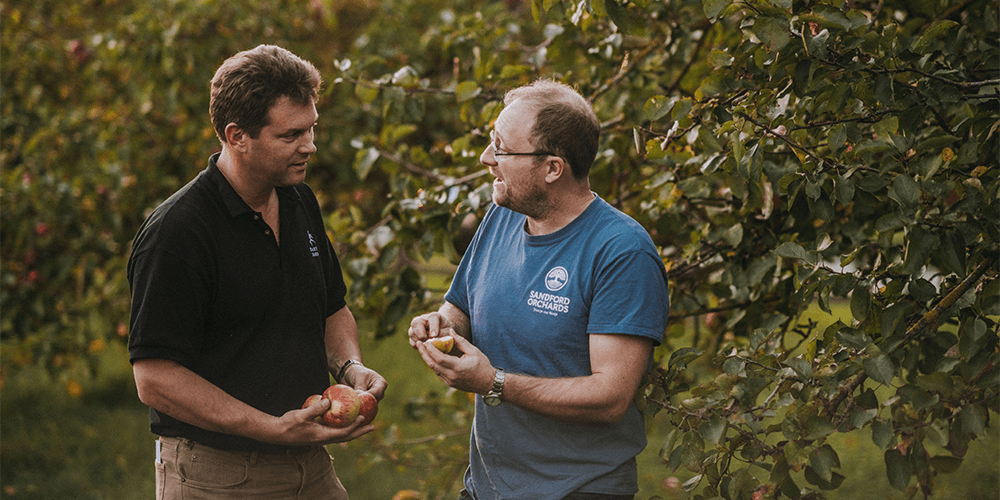 We have witnessed a prevailing narrative advanced by the media that dismisses many of the producers we champion such as Vicky’s bread or Quickes Cheese as luxuries, superfluous in a time of crisis. However, this couldn’t be further from the truth. The milk, cheese, bread, vegetables and meat found in our food hall may be a little more expensive than you’d find in a supermarket, but that does not make them any less essential. The difference is you are directly sustaining practices like good animal welfare, regenerative agriculture and a thriving local economy. This distinction between ‘luxuries’ and ‘essentials you pay more for because they support a sustainable food system’ is one that needs to be clarified urgently. We’re not interested in selling huge volumes of food, we are in business to provide a platform for sustainably minded and conscientious producers, who just happen to make amazing food and drink. The only thing being sustained when eggs, milk, meat and veg are brought cheap is big business and corporate greed.
We have witnessed a prevailing narrative advanced by the media that dismisses many of the producers we champion such as Vicky’s bread or Quickes Cheese as luxuries, superfluous in a time of crisis. However, this couldn’t be further from the truth. The milk, cheese, bread, vegetables and meat found in our food hall may be a little more expensive than you’d find in a supermarket, but that does not make them any less essential. The difference is you are directly sustaining practices like good animal welfare, regenerative agriculture and a thriving local economy. This distinction between ‘luxuries’ and ‘essentials you pay more for because they support a sustainable food system’ is one that needs to be clarified urgently. We’re not interested in selling huge volumes of food, we are in business to provide a platform for sustainably minded and conscientious producers, who just happen to make amazing food and drink. The only thing being sustained when eggs, milk, meat and veg are brought cheap is big business and corporate greed.
As we look to the future, a very realistic scenario is that a vast percentage of our wonderful artisan food community could be forced to close their doors indefinitely. Alternatively, as food lovers, we could harness our collective potential and spark an upsurge of social commitment to supporting local, sustainable and artisan food and drink producers. The likelihood of the latter outcome could be enhanced by some form of government support. The introduction of a ‘polluter pays principle’ where industrial producers are held accountable for the adverse effects they have on our environment would be welcomed with open arms by producers and retailers whose environmental credentials often hamper their competitiveness. This could be supplemented with price support and a redirection of subsidies aimed at revitalizing local supply chain infrastructure. Maybe the most realistic olive branch would be a commitment to preferential purchase of local food for the public plate. However, after seeing that children eligible for free school meals were given vouchers only redeemable in supermarkets we shouldn’t hold our breath, we simply don’t have time. Perhaps at this stage, the best thing government can do is stay out the way and allow the ingenuity of farmers to prevail.
This leaves us with the only realistic vehicle for change being citizen action. To make an impact we must unleash the collaborative potential of our food community. Producers, retailers and consumers must mobilize with initiatives to ensure that our voices are being heard, our food eaten and our environment sustained. As a retailer, we successfully launched an online delivery service, distributing hundreds of local artisan ‘essentials’ alongside boxes specially designed to support producers who are desperate to be on our plates. For instance, our ’30 Days to Save British Cheese’ box will provide a vessel for world class farmhouse cheese producers whose ripening stock was destined for restaurants and whose cows, goats and sheep still need to be milked each day. Unfortunately, you can’t furlough a herd of 60 Holstein-Friesian cattle!
The support from our community has been inspiring, with an abundance of customers offering to help with home deliveries and donating towards our Easter tuck boxes for Exeter foodbank. Our amazing team of staff has been dynamic, selfless and unfaltering and many of our suppliers have moved heaven and earth to help us get their products to the people. Our good friend and supplier, John Pritchard, whose restaurant wholesale business got wiped out overnight has been distributing our boxes across Devon - keeping his vans on the road and his team in work. At this time of crisis, we must turn a potential catastrophe into an opportunity manifesting as the renaissance in the production, distribution and consumption of healthy, seasonal and local food.
Our question is, when all is said and done - what sort of world do we want to be left with? A world of industrial homogenisation where cheese means block cheddar, beer is a can of Carlsberg and meat is farmed in sheds the size of football stadiums? Let’s be proud of our producers, our provenance and our heritage. We as consumers have the power to determine our future and our buying decisions will make an impact. Let’s eat with purpose, let’s eat for change.
